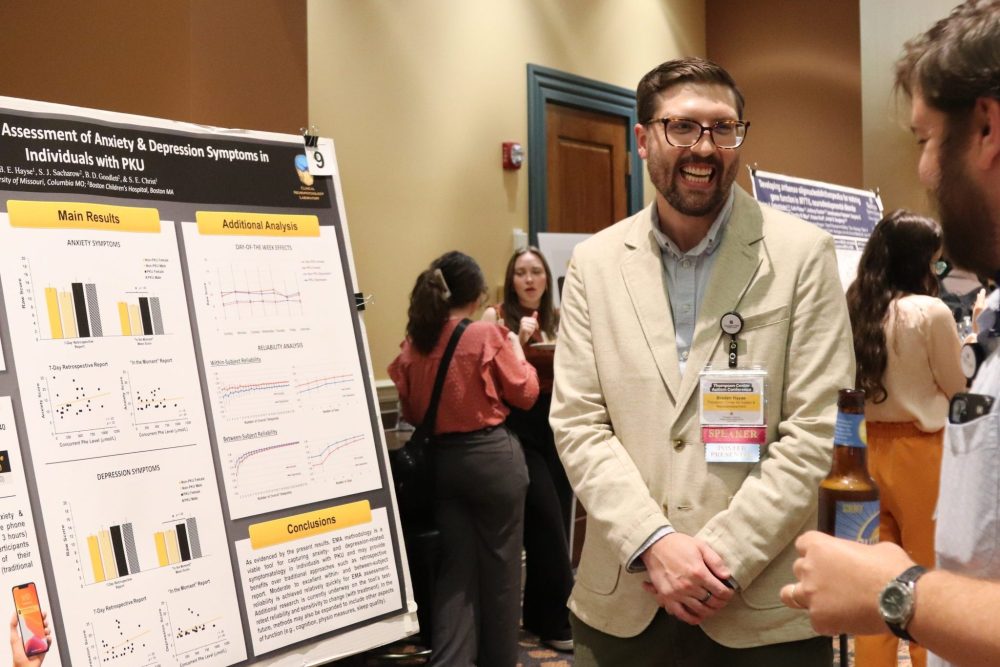Photo: Braden Hayse at 2024 Student, Trainee, and Early Professional Poster Session (STEPP) at the Thompson Center Autism Conference. Hayse’s poster “Ecological Momentary Assessment of Anxiety and Depression Symptoms in Individuals with Phenylketonuria” received a first-place prize.
This article is from the fall 2024 issue of DISCOVERY, the Thompson Center’s research newsletter.
Braden Hayse joined the Thompson Center in 2018 as a psychometrist and a graduate research assistant and practicum student in 2020. Braden’s research area of interest is primarily surrounding sleep in individuals with neurodevelopmental disorders or rare diseases. He is particularly interested in mechanisms of common sleep difficulties, the impact of sleep problems on factors related to quality of life, and usefulness of sleep treatments in different populations.
Tell us about your educational background.
My undergraduate degree was in psychology. After receiving a master’s degree in cognition and neuroscience, I started a doctoral program in clinical psychology at the University of Missouri and am currently in my fifth year.
What brought you to the Thompson Center?
I originally wanted more clinical experience administering assessments for neuropsychological and psychodiagnostic evaluations after graduating from my master’s program. Luckily, the Thompson Center hired me as a psychometrist, and I have continuously kept coming back for either research projects or practicum training since beginning my doctoral program.
How did you first get involved with autism research?
The Thompson Center gave me my formal introduction to research with autism while still a psychometrist by providing opportunities to work on several studies with the Research Core.
What’s your favorite thing about working in this field?
My favorite thing about working in this field is the people. That includes the individuals and families I have the pleasure of meeting while providing care in different settings, as well as the colleagues and mentors who consistently amaze me.
What study have you been most excited to be involved in?
The most impactful study I have been involved in thus far has been the RECHArge sleep clinical trial. My role as a therapist on the project was exceptionally fulfilling as a clinician by allowing me to individually connect with families and observe the numerous benefits of sleep intervention. At the same time, the information I gathered as a researcher was both personally beneficial and sparked many of the questions I continue to explore as my professional career develops.
What are your plans for after your time as a trainee?
After my time as a practicum student at the Thompson Center, my immediate plan is to, hopefully, be accepted to an internship program followed by a postdoctoral fellowship position with opportunities to gain more experience in both neuropsychological assessments and autism diagnostic evaluations.
What vision do you have for your career?
Currently, I envision myself performing both neuropsychological and autism diagnostic evaluations. I also plan to conduct research in some capacity, most likely focused on better understanding sleep difficulties and the benefits of sleep interventions.
How do you think your time at the Thompson Center will influence the direction of your career?
My time at the Thompson Center has influenced most of my career direction choices since the first day I began working here and will probably continue to do so. It has given me opportunities to see providers conducting multiple types of clinical evaluations of professional interest, to be involved in various research activities that have sparked my curiosity, and to obtain invaluable guidance from many gracious mentors as my career path has taken shape.


